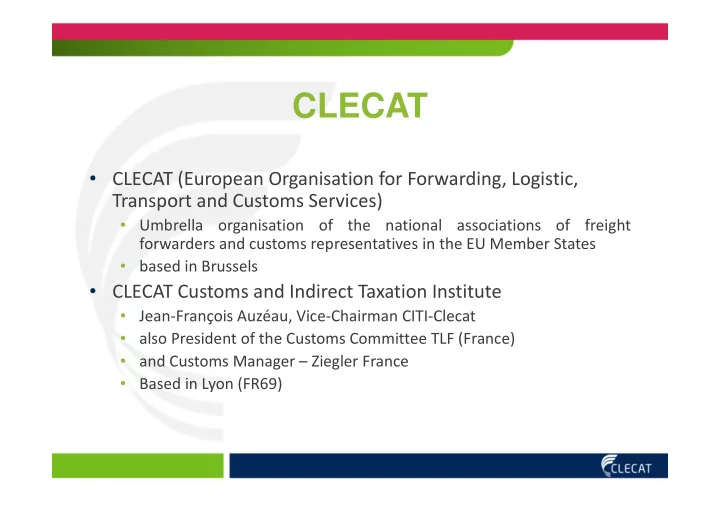

CLECAT • CLECAT (European Organisation for Forwarding, Logistic, Transport and Customs Services) • Umbrella organisation of the national associations of freight forwarders and customs representatives in the EU Member States • based in Brussels • CLECAT Customs and Indirect Taxation Institute • Jean-François Auzéau, Vice-Chairman CITI-Clecat • also President of the Customs Committee TLF (France) • and Customs Manager – Ziegler France • Based in Lyon (FR69)
A logical consequence of the UCC • Customs infringements and sanctions should be harmonized • It is certainly not understandable that the UE has adopted common rules as far as Customs matters are concerned and that infringements and sanctions remain under national definition and administration. • The lack of harmonization leads to discrepancies which have led in the past to apply different sanctions to the same infringement. • This could have been acceptable at a time where operators were acting on national level. This is no longer possible in a wide and open market. • We therefore, as Clecat, support the idea of a Directive on customs infringments and sanctions. • But the Commission Proposal as it stands cannot be supported.
The need for a clarification of infringments and sanctions • Whereas we support the objectives, the Proposal does not reach them. Here are a few controversial points: • Strict liability v/s minor infringements with no or almost no financial consequences? • Strict liability v/s necessary co-operation between “trusted” operators (AEO) and Customs administration(s) ? • Negligence v/s intention : two concepts which not always fit together ? • Co-operation v/s incitement, aiding, abetting, attempting ? • Legal persons v/s natural persons ? • Criminal proceedings v/s administrative sanctions
Some advice (if we may !) • Points to be clearly set in order to achieve harmonization, effectiveness and parity. • Distinguish infringements affecting resources affected to the U.E. or to the Member States. • Maintain the possibility for MS to reach a settlement rather than to proceed and to seek for judgement by a court (criminal or not). The “A good agreement is better than a bad trial” principle should apply. • Take into account the AEO status (as a mitigating factor). • Make sanctions proportional to the debt incurred and not to the value of the goods.
• Thank you for your kind attention.
Recommend
More recommend